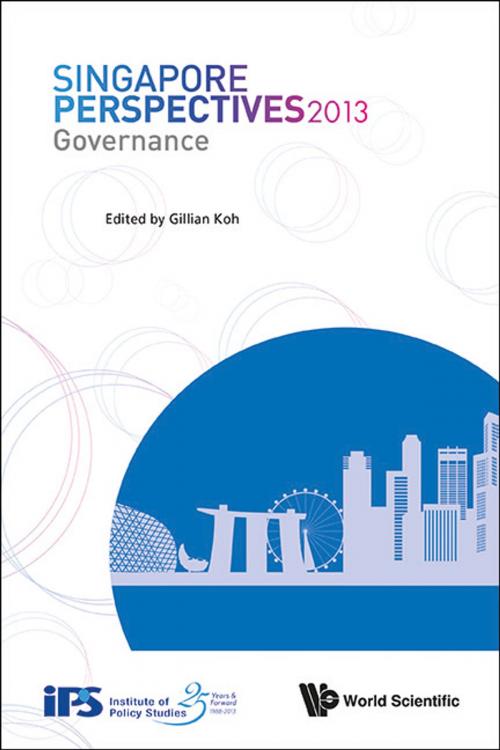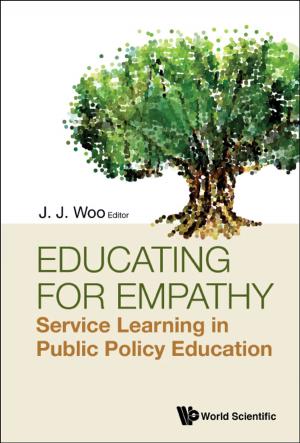Singapore Perspectives 2013
Governance
Nonfiction, Social & Cultural Studies, Political Science, Government, Public Policy, International| Author: | Gillian Koh | ISBN: | 9789814520768 |
| Publisher: | World Scientific Publishing Company | Publication: | October 18, 2013 |
| Imprint: | WSPC/IPS | Language: | English |
| Author: | Gillian Koh |
| ISBN: | 9789814520768 |
| Publisher: | World Scientific Publishing Company |
| Publication: | October 18, 2013 |
| Imprint: | WSPC/IPS |
| Language: | English |
This volume is conceptualised around the notion by Raymond Williams, a cultural theorist, that any cultural system comprises fragments of the past and the emergent alongside the dominant. The book focuses on ‘governance’ or how a society governs itself across the state, business and civic sectors in Singapore and how it might evolve over the next decade. Its first section looks at how Singapore's political history has shaped today's political institutions and culture and why these might change. Three scenarios of Singapore's political future are proffered. The authors argue how there are and must be nevertheless some fundamental values that underpin Singapore's governance system that are unchanging.
In the second section, the authors discuss how the relationship among the key elements of the governance equation have changed to adapt to current conditions, and must continue to change to respond to internal demands and external conditions. The first paper describes how the relationship between government and business, or state and market have adapted to achieve strategic national imperatives but also to ensure that citizens benefit from the most efficient and effective ways of providing important public goods. The second paper argues for institutionalised dissent and policy experimentation as disciplines needed in the public sector to make it innovative and resilient.
The third section offers views on emerging trends in political culture and the relationship between the government and civil society, business and other political parties. These are based on findings of an IPS survey, and opinions of civic leaders and a leader of the political opposition in Singapore.
The final section comprises an edited transcript of a dialogue session with the Prime Minister of Singapore, Mr Lee Hsien Loong on the same theme of ‘governance’.
The authors are thought-leaders and political leaders in Singapore. This book serves as a pathfinder to emerging political trends in the country.
Contents:
-
Preface (Janadas Devan)
-
Acknowledgements
-
Introduction (Gillian Koh)
-
The Residual:
- Governance in Singapore: History and Legacy (Chan Heng Chee)
- Three Scenarios for Singapore's Political Future (Kishore Mahbubani)
-
The Dominant:
- Governing in the Future — Together (Lawrence Wong)
- Sustaining Good Governance in an Era of Rapid and Disruptive Change (Donald Low)
-
The Emergent:
- The Emergent in Governance in Singapore (Gillian Koh)
- Civil Society in Singapore: Revisiting the Banyan Tree (Nizam Ismail)
- The Role of Political Competition in Promoting Well-being (Sylvia Lim)
- Emergent Issues and Questions (Lee Tzu Yang)
-
Dialogue Session with the Prime Minister
Readership: Students, academics, policy makers and civil society activists, and general public interested in Singapore.
Key Features:
- Focuses on ‘governance’ or how a society governs itself across the state, business and civic sectors in Singapore and how it might evolve over the next decade
- Discusses how the relationship among the key elements of the governance equation have changed to adapt to current conditions, and must continue to change to respond to internal demands and external conditions
- Offers views on emerging trends in political culture and the relationship between the government and civil society, business and other political parties
- Authors are thought-leaders and political leaders in Singapore
This volume is conceptualised around the notion by Raymond Williams, a cultural theorist, that any cultural system comprises fragments of the past and the emergent alongside the dominant. The book focuses on ‘governance’ or how a society governs itself across the state, business and civic sectors in Singapore and how it might evolve over the next decade. Its first section looks at how Singapore's political history has shaped today's political institutions and culture and why these might change. Three scenarios of Singapore's political future are proffered. The authors argue how there are and must be nevertheless some fundamental values that underpin Singapore's governance system that are unchanging.
In the second section, the authors discuss how the relationship among the key elements of the governance equation have changed to adapt to current conditions, and must continue to change to respond to internal demands and external conditions. The first paper describes how the relationship between government and business, or state and market have adapted to achieve strategic national imperatives but also to ensure that citizens benefit from the most efficient and effective ways of providing important public goods. The second paper argues for institutionalised dissent and policy experimentation as disciplines needed in the public sector to make it innovative and resilient.
The third section offers views on emerging trends in political culture and the relationship between the government and civil society, business and other political parties. These are based on findings of an IPS survey, and opinions of civic leaders and a leader of the political opposition in Singapore.
The final section comprises an edited transcript of a dialogue session with the Prime Minister of Singapore, Mr Lee Hsien Loong on the same theme of ‘governance’.
The authors are thought-leaders and political leaders in Singapore. This book serves as a pathfinder to emerging political trends in the country.
Contents:
-
Preface (Janadas Devan)
-
Acknowledgements
-
Introduction (Gillian Koh)
-
The Residual:
- Governance in Singapore: History and Legacy (Chan Heng Chee)
- Three Scenarios for Singapore's Political Future (Kishore Mahbubani)
-
The Dominant:
- Governing in the Future — Together (Lawrence Wong)
- Sustaining Good Governance in an Era of Rapid and Disruptive Change (Donald Low)
-
The Emergent:
- The Emergent in Governance in Singapore (Gillian Koh)
- Civil Society in Singapore: Revisiting the Banyan Tree (Nizam Ismail)
- The Role of Political Competition in Promoting Well-being (Sylvia Lim)
- Emergent Issues and Questions (Lee Tzu Yang)
-
Dialogue Session with the Prime Minister
Readership: Students, academics, policy makers and civil society activists, and general public interested in Singapore.
Key Features:
- Focuses on ‘governance’ or how a society governs itself across the state, business and civic sectors in Singapore and how it might evolve over the next decade
- Discusses how the relationship among the key elements of the governance equation have changed to adapt to current conditions, and must continue to change to respond to internal demands and external conditions
- Offers views on emerging trends in political culture and the relationship between the government and civil society, business and other political parties
- Authors are thought-leaders and political leaders in Singapore















